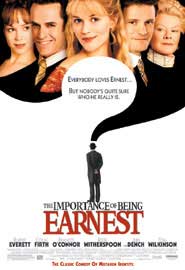| The
Importance of Being Earnest |
|
|
Another Hollywood stab at English period drama. Director Oliver Parker puts a new spin on the Oscar Wilde favourite with a ragtime soundtrack and a nod to girl power. The
plot is merely a peg for Wilde's witticisms (viz., Miss Prism's 'the good
ended happily and the bad unhappily. That is what Fiction means'). Jack
Worthing (Colin Firth) invents a brother, Ernest, whose bad behaviour
requires him to visit London and escape his country estate. There, as
'Ernest', he woos the fair Gwendolen Fairfax (Frances O'Connor). Her scary
mummy, Lady Bracknell (Judi Dench, again), will have none of it, on learning
that Jack/Ernest was a foundling. To make matters worse, Gwendolen's affection
depends on his having 'the name of Ernest'. Her cousin Algernon (Rupert
Everett) learns that Jack has an extremely pretty niece (Reese Witherspoon)
in the country, and turns up pretending to be the scandalous brother to
win her affections. Much confusion ensues…
|
 |
|
There is much to be said for the Parker version. The cast is stellar - with Anna Massey and Tom Wilkinson (In the Bedroom, The Full Monty) in supporting roles - and it is lush, even spectacular. By no means is it a straight film version of the play, unlike the 1952 Anthony Asquith version. Rupert Everett camps up Algernon even more than could have been thought possible. Gwendolen is played by O'Connor as lively and spirited, dispensing with the usual haughtiness. She flourishes her fags and buzzes round the country in a motor-car. Reese Witherspoon is indeed excessively pretty, while Judi Dench utters the famous handbag line in such an unnaturally calm way that you know Jack is in really, really deep trouble. And yet. The famous Wildean wit is somehow lost in the physical comedy. The music and motor-car are not in keeping with 1895 England. The pre-Raphaelite dream sequences overdo Cecily's sentimentality and are dull. Algernon visits the country in a hot-air balloon. Gwendolen acquires a tattoo. A racy past is invented for Lady Bracknell. Algernon and Jack serenade their sweethearts with a pop song. Colin Firth is Mr-Darcy-trying-to-be-funny. Reese Witherspoon's comic talent is nowhere apparent. For
wit and subtlety, return to the 1952 version, with Michael Redgrave and
Edith Evans (it's repeated on afternoon telly every year). But for an
assault-your-senses version, this is an interesting attempt, even if it
goes too far.
Siobhan McAndrew 26.09.02 |
|